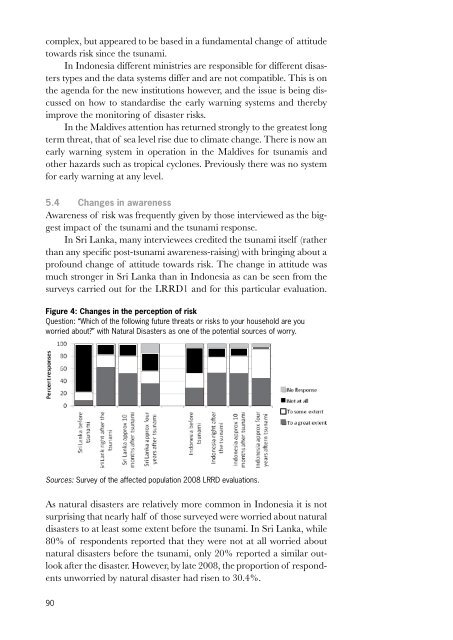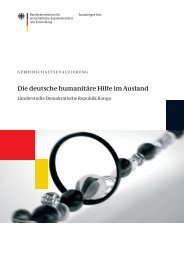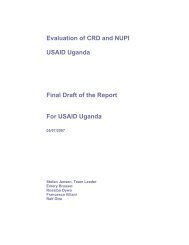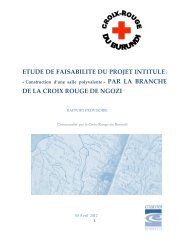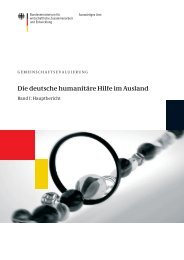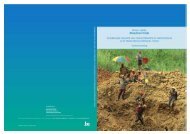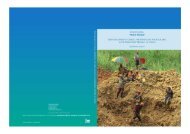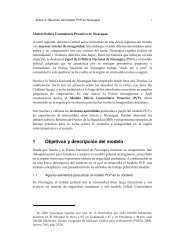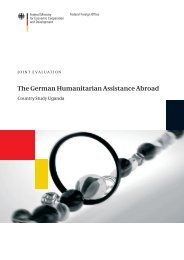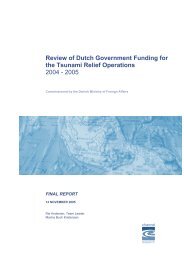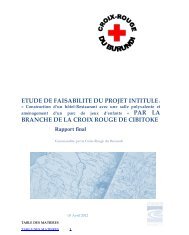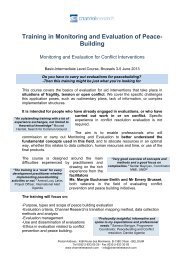A ripple in development? - Channel Research
A ripple in development? - Channel Research
A ripple in development? - Channel Research
You also want an ePaper? Increase the reach of your titles
YUMPU automatically turns print PDFs into web optimized ePapers that Google loves.
complex, but appeared to be based <strong>in</strong> a fundamental change of attitude<br />
towards risk s<strong>in</strong>ce the tsunami.<br />
In Indonesia different m<strong>in</strong>istries are responsible for different disasters<br />
types and the data systems differ and are not compatible. This is on<br />
the agenda for the new <strong>in</strong>stitutions however, and the issue is be<strong>in</strong>g discussed<br />
on how to standardise the early warn<strong>in</strong>g systems and thereby<br />
improve the monitor<strong>in</strong>g of disaster risks.<br />
In the Maldives attention has returned strongly to the greatest long<br />
term threat, that of sea level rise due to climate change. There is now an<br />
early warn<strong>in</strong>g system <strong>in</strong> operation <strong>in</strong> the Maldives for tsunamis and<br />
other hazards such as tropical cyclones. Previously there was no system<br />
for early warn<strong>in</strong>g at any level.<br />
5.4 Changes <strong>in</strong> awareness<br />
Awareness of risk was frequently given by those <strong>in</strong>terviewed as the biggest<br />
impact of the tsunami and the tsunami response.<br />
In Sri Lanka, many <strong>in</strong>terviewees credited the tsunami itself (rather<br />
than any specific post-tsunami awareness-rais<strong>in</strong>g) with br<strong>in</strong>g<strong>in</strong>g about a<br />
profound change of attitude towards risk. The change <strong>in</strong> attitude was<br />
much stronger <strong>in</strong> Sri Lanka than <strong>in</strong> Indonesia as can be seen from the<br />
surveys carried out for the LRRD1 and for this particular evaluation.<br />
Figure 4: Changes <strong>in</strong> the perception of risk<br />
Question: “Which of the follow<strong>in</strong>g future threats or risks to your household are you<br />
worried about?” with Natural Disasters as one of the potential sources of worry.<br />
Sources: Survey of the affected population 2008 LRRD evaluations.<br />
As natural disasters are relatively more common <strong>in</strong> Indonesia it is not<br />
surpris<strong>in</strong>g that nearly half of those surveyed were worried about natural<br />
disasters to at least some extent before the tsunami. In Sri Lanka, while<br />
80% of respondents reported that they were not at all worried about<br />
natural disasters before the tsunami, only 20% reported a similar outlook<br />
after the disaster. However, by late 2008, the proportion of respondents<br />
unworried by natural disaster had risen to 30.4%.<br />
90


